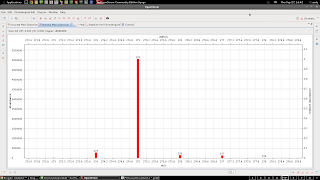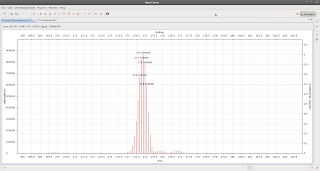Here's the molecular weight part of the
isotopic pattern calculator in a previous post.
Most people won't need a full molecular weight calculator with plotting of isotopic composition, so I'm publishing the molecular weight part as a separate program.
The actual algorithm is fairly simple and is more or less contained in the formulaExpander function below. It looks messy because of the definition of the PeriodicTable dictionary at the beginning, but it's simple.
Copy the code, past it into a file (call it e.g. molcalc), put it in e.g. /usr/local/bin and chmod +x it.
Usage:
molcalc 'Mg2(PO4)3'
returns
The mass of Mg2P3O12 is 333.524247 and the calculated charge is -5.
The charge is based on my default oxidation states -- depending on what kind of chemistry you do the oxidation states you encounter are likely to differ.
#!/usr/bin/python2.7
#########################################################################
# Principal author of current version: Me
# Isotopic abundances and masses were copied from Wsearch32.
#
#
# Dependencies:
# To be honest I'm not quite certain. At a minimum you will need python2.7,
# python-numpy
#
#########################################################################
import re #for regular expressions
import sys
from numpy import matrix,transpose # for molw calc
try:
molecules=sys.argv[1]
except:
quit()
#slowly changed to IUPAC 1997 isotopic compositions and IUPAC 2007 masses
# see http://pac.iupac.org/publications/pac/pdf/1998/pdf/7001x0217.pdf for
# natural variations in isotopic composition
PeriodicTable ={
'H':[1,1,[1.0078250321,2.0141017780],[0.999885,0.0001157]], # iupac '97 in water
'He':[2,0,[3.0160293097,4.0026032497],[0.00000137,0.99999863]], # iupac iso '97
'Li':[3,1,[6.0151233,7.0160040],[0.0759,0.9241]], # iupac '97
'Be':[4,2,[9.0121821],[1.0]], # iupac '97
'B':[5,3,[10.0129370,11.0093055],[0.199,0.801]], # iupac' 97
'C':[6,4,[12.0,13.0033548378],[0.9893,0.0107]], # iupac '97
'N':[7,5,[14.0030740052,15.0001088984],[0.99632,0.00368]], # iupac '97
'O':[8,-2,[15.9949146221,16.99913150,17.9991604],[0.99757,0.00038,0.00205]], # iupac '97
'F':[9,-1,[18.99840320],[1.0]], # iupac '97
'Ne':[10,0,[19.9924401759,20.99384674,21.99138551],[0.9048,0.0027,0.0925]], # iupac '97 in air
'Na':[11,1,[22.98976967],[1.0]], #iupac '97
'Mg':[12,2,[23.98504190,24.98583702,25.98259304],[0.7899,0.10,0.1101]], #iupac '97
'Al':[13,3,[26.98153844],[1.0]], #iupac '97
'Si':[14,4,[27.9769265327,28.97649472,29.97377022],[0.92297,0.046832,0.030872]],#iupac '97
'P':[15,5,[30.97376151],[1.0]], #iupac '97
'S':[16,-2,[31.97207069,32.97145850,33.96786683,35.96708088],[0.9493,0.0076,0.0429,0.0002]], #iupac '97
'Cl':[17,-1,[34.96885271,36.96590260],[0.7578,0.2422]], #iupac '97
'Ar':[18,0,[35.96754628,37.9627322,39.962383123],[0.003365,0.000632,0.996003]],#iupac '97 in air
'K':[19,1,[38.9637069,39.96399867,40.96182597],[0.932581,0.000117,0.067302]], #iupac '97
'Ca':[20,2,[39.9625912,41.9586183,42.9587668,43.9554811,45.9536928,47.952534],[0.96941,0.00647,0.00135,0.02086,0.00004,0.00187]], #iupac '97
'Sc':[21,3,[44.9559102],[1.0]], #iupac '97
'Ti':[22,4,[45.9526295,46.9517638,47.9479471,48.9478708,49.9447921],[0.0825,0.0744,0.7372,0.0541,0.0518]], #iupac '97
'V':[23,5,[49.9471628,50.9439637],[0.00250,0.99750]], #iupac '97
'Cr':[24,2,[49.9460496,51.9405119,52.9406538,53.9388849],[0.04345,0.83789,0.09501,0.02365]], #iupac '97
'Mn':[25,2,[54.9380496],[1.0]], #iupac '97
'Fe':[26,3,[53.9396148,55.9349421,56.9353987,57.9332805],[0.05845,0.91754,0.02119,0.00282]], #iupac '97
'Ni':[27,3,[57.9353479,59.9307906,60.9310604,61.9283488,63.9279696],[0.680769,0.262231,0.011399,0.036345,0.009256]], #iupac '97
'Co':[28,2,[58.933195],[1.0]], #iupac '97
'Cu':[29,2,[62.9296011,64.9277937],[0.6917,0.3083]], #iupac '97
'Zn':[30,2,[63.9291466,65.9260368,66.9271309,67.9248476,69.925325],[0.4863,0.2790,0.0410,0.1875,0.0062]], #iupac '97
'Ga':[31,3,[68.925581,70.9247050],[0.60108,0.39892]], #iupac '97
'Ge':[32,2,[69.9242504,71.9220762,72.9234594,73.9211782,75.9214027],[0.2084,0.2754,0.0773,0.3628,0.0761]], #iupac '97
'As':[33,3,[74.9215964],[1.0]], #iupac '97
'Se':[34,4,[73.9224766,75.9192141,76.9199146,77.9173095,79.9165218,81.9167000],[0.0089,0.0937,0.0763,0.2377,0.4961,0.0873]], #iupac '97
'Br':[35,-1,[78.9183376,80.916291],[0.5069,0.4931]],#iupac '97
'Kr':[36,0,[77.920386,79.916378,81.9134846,82.914136,83.911507,85.9106103],[0.0035,0.0228,0.1158,0.1149,0.5700,0.1730]], #iupac '97 in air
'Rb':[37,1,[84.9117893,86.9091835],[0.7217,0.2783]], #iupac '97
'Sr':[38,2,[83.913425,85.9092624,86.9088793,87.9056143],[0.0056,0.0986,0.0700,0.8258]], #iupac '97
'Y': [39,3,[88.9058479],[1.0]], #iupac '97
'Zr': [40,4,[89.9047037,90.9056450,91.9050401,93.9063158,95.908276],[0.5145,0.1122,0.1715,0.1738,0.0280]],#iupac '97
'Nb':[41,5,[92.9063775],[1.0]], #iupac '97
'Mo':[42,6,[91.906810,93.9050876,94.9058415,95.9046789,96.9060210,97.9054078,99.907477],[0.1484,0.0925,0.1592,0.1668,0.0955,0.2413,0.0963]], #checked, iupac '97
'Tc': [43,2,[96.906365,97.907216,98.9062546],[1.0]], #no natural abundance
'Ru': [44,3,[95.907598,97.905287,98.9059393,99.9042197,100.9055822,101.9043495,103.905430],[0.0554,0.0187,0.1276,0.1260,0.1706,0.3155,0.1862]], #iupac '97
'Rh':[45,2,[102.905504],[1.0]], #iupac '97
'Pd':[46,2,[101.905608,103.904035,104.905084,105.903483,107.903894,109.905152],[0.0102,0.1114,0.2233,0.2733,0.2646,0.1172]], #iupac '97
'Ag':[47,1,[106.905093,108.904756],[0.51839,0.48161]], #iupac '97
'Cd':[48,2,[105.906458,107.904183,109.903006,110.904182,111.9027572,112.9044009,113.9033581,115.904755],[0.0125,0.0089,0.1249,0.1280,0.2413,0.1222,0.2873,0.0749]],#iupac '97
'In':[49,3,[112.904061,114.903878],[0.0429,0.9571]], #iupac '97
'Sn':[50,4,[111.904821,113.902782,114.903346,115.901744,116.902954,117.901606,118.903309,119.9021966,121.9034401,123.9052746],[0.0097,0.0066,0.0034,0.1454,0.0768,0.2422,0.0859,0.3258,0.0463,0.0579]], #iupac '97
'Sb':[51,3,[120.9038180,122.9042157],[0.5721,0.4279]], #iupac '97
'Te':[52,4,[119.904020,121.9030471,122.9042730,123.9028195,124.9044247,125.9033055,127.9044614,129.9062228],[0.0009,0.0255,0.0089,0.0474,0.0707,0.1884,0.3174,0.3408]],#iupac '97
'I':[53,-1,[126.904468],[1.0]], #iupac '97
'Xe':[54,0,[123.9058958,125.904269,127.9035304,128.9047795,129.9035079,130.9050819,131.9041545,133.9053945,135.907220],[0.0009,0.0009,0.0192,0.2644,0.0408,0.2118,0.2689,0.1044,0.0887]], #iupac '97
'Cs':[55,1,[132.905447],[1.0]], #iupac '97
'Ba':[56,2,[129.906310,131.905056,133.904503,134.905683,135.904570,136.905821,137.905241],[0.00106,0.00101,0.02417,0.06592,0.07854,0.11232,0.71698]], #iupac '97
'La':[57,3,[137.907107,138.906348],[0.00090,0.99910]],#iupac '97
'Ce':[58,3,[135.907140,137.905986,139.905434,141.909240],[0.00185,0.00251,0.88450,0.11114]],#iupac '97
'Pr':[59,3,[140.907648],[1.0]], #iupac '97
'Nd':[60,3,[141.907719,142.909810,143.910083,144.912569,145.913112,147.916889,149.920887],[0.272,0.122,0.238,0.083,0.172,0.057,0.056]],#iupac '97
'Pm':[61,3,[144.91270],[1.0]], #no natural occurence
'Sm':[62,3,[143.911995,146.914893,147.914818,148.917180,149.917271,151.919728,153.922205],[0.0307,0.1499,0.1124,0.1382,0.0738,0.2675,0.2275]], #iupac '97
'Eu':[63,3,[150.919846,152.921226],[0.4781,0.5219]], #iupac '97
'Gd':[64,3,[151.919788,153.920862,154.922619,155.922120,156.923957,157.924101,159.927051],[0.0020,0.0218,0.1480,0.2047,0.1565,0.2484,0.2186]],#iupac '97
'Tb':[65,4,[158.925343],[1.0]], #iupac '97
'Dy':[66,3,[155.924278,157.924405,159.925194,160.926930,161.926795,162.928728,163.929171],[0.0006,0.0010,0.0234,0.1891,0.2551,0.2490,0.2818]], #iupac '97
'Ho':[67,3,[164.930319],[1.0]], #iupac '97
'Er':[68,3,[161.928775,163.929197,165.930290,166.932045,167.932368,169.935460],[0.0014,0.0161,0.3361,0.2293,0.2678,0.1493]], #iupac '97
'Tm':[69,3,[168.934211],[1.0]], #iupac '97
'Yb':[70,3,[167.933894,169.934759,170.936322,171.9363777,172.9382068,173.9388581,175.942568],[0.0013,0.0304,0.1428,0.2183,0.1613,0.3183,0.1276]], #iupac '97
'Lu':[71,3,[174.9407679,175.9426824],[0.9741,0.0259]],#iupac '97
'Hf':[72,4,[173.940040,175.9414018,176.9432200,177.9436977,178.9458151,179.9465488],[0.0016,0.0526,0.1860,0.2728,0.1362,0.3508]], #iupac '97
'Ta':[73,5,[179.947466,180.947996],[0.00012,0.99988]], #iupac '97
'W':[74,6,[179.946704,181.9482042,182.9502230,183.9509312,185.9543641],[0.0012,0.2650,0.1431,0.3064,0.2843]], #iupac '97
'Re':[75,2,[184.9529557,186.9557508],[0.3740,0.6260]],#iupac '97
'Os':[76,4,[183.952491,185.953838,186.9557479,187.9558360,188.9581449,189.958445,191.961479],[0.0002,0.0159,0.0196,0.1324,0.1615,0.2626,0.4078]],#iupac '97
'Ir':[77,4,[190.960591,192.962924],[0.373,0.627]], #iupac '97
'Pt':[78,4,[189.959930,191.961035,193.962664,194.964774,195.964935,197.967876],[0.00014,0.00782,0.32967,0.33832,0.25242,0.07163]],#iupac '97
'Au':[79,3,[196.966552],[1.0]], #iupac '97
'Hg':[80,2,[195.965815,197.966752,198.968262,199.968309,200.970285,201.970626,203.973476],[0.0015,0.0997,0.1687,0.2310,0.1318,0.2986,0.0687]], #iupac '97
'Tl':[81,1,[202.972329,204.974412],[0.29524,0.70476]], #iupac '97
'Pb':[82,2,[203.973029,205.974449,206.975881,207.976636],[0.014,0.241,0.221,0.524]],#
'Bi':[83,3,[208.980383],[1.0]], #iupac '97
'Po':[84,4,[209.0],[1.0]],
'At':[85,7,[210.0],[1.0]],
'Rn':[86,0,[220.0],[1.0]],
'Fr':[87,1,[223.0],[1.0]],
'Ra':[88,2,[226.0],[1.0]],
'Ac':[89,3,[227.0],[1.0]],
'Th':[90,4,[232.0380504],[1.0]], #iupac '97
'Pa':[91,4,[231.03588],[1.0]],
'U':[92,6,[234.0409456,235.0439231,236.0455619,238.0507826],[0.000055,0.007200,0.0,0.992745]], #iupac '97
'Np':[93,5,[237.0],[1.0]],
'Pu':[94,3,[244.0],[1.0]],
'Am':[95,2,[243.0],[1.0]],
'Cm':[96,3,[247.0],[1.0]],
'Bk':[97,3,[247.0],[1.0]],
'Cf':[98,0,[251.0],[1.0]],
'Es':[99,0,[252,.0],[1.0]],
'Fm':[100,0,[257.0],[1.0]],
'Md':[101,0,[258.0],[1.0]],
'No':[102,0,[259.0],[1.0]],
'Lr':[103, 0,[262.0],[1.0]],
'Rf':[104, 0,[261.0],[1.0]],
'Db':[105, 0,[262.0],[1.0]],
'Sg':[106, 0,[266.0],[1.0]]
}
#######################################
# Collect properties
#######################################
def getMass(x):
atom=re.findall('[A-Z][a-z]*',x)
number=re.findall('[0-9]+', x)
if len(number) == 0:
multiplier = 1
else:
multiplier = float(number[0])
atomic_mass=float(matrix(PeriodicTable[atom[0]][2])*transpose(matrix(PeriodicTable[atom[0]][3])))
# That's right -- the molecular weight is based on the isotopes and ratios
return (atomic_mass*multiplier)
def getCharge(x):
atom=re.findall('[A-Z][a-z]*',x)
number=re.findall('[0-9]+', x)
if len(number) == 0:
multiplier = 1
else:
multiplier = float(number[0])
atomic_charge=float(PeriodicTable[atom[0]][1])
return (atomic_charge*multiplier)
#####################################################
# Iterate over expanded formula to collect property
#####################################################
def molmass(formula):
mass=0
while (len(formula)>0):
segments = re.findall('[A-Z][a-z]*[0-9]*',formula)
for i in range(0, len(segments)):
mass+=getMass(segments[i])
formula=re.sub(formula, '', formula)
return mass
def molcharge(formula):
charge=0
while (len(formula)>0):
segments = re.findall('[A-Z][a-z]*[0-9]*',formula)
for i in range(0, len(segments)):
charge+=getCharge(segments[i])
formula=re.sub(formula, '', formula)
return charge
################################################################################
#expands ((((M)N)O)P)Q to M*N*O*P*Q
################################################################################
def formulaExpander(formula):
while len(re.findall('\(\w*\)',formula))>0:
parenthetical=re.findall('\(\w*\)[0-9]+',formula)
for i in parenthetical:
p=re.findall('[0-9]+',str(re.findall('\)[0-9]+',i)))
j=re.findall('[A-Z][a-z]*[0-9]*',i)
oldj=j
for n in range(0,len(j)):
numero=re.findall('[0-9]+',j[n])
if len(numero)!=0:
for k in numero:
nu=re.sub(k,str(int(int(k)*int(p[0]))),j[n])
else:
nu=re.sub(j[n],j[n]+p[0],j[n])
j[n]=nu
newphrase=""
for m in j:
newphrase+=str(m)
formula=formula.replace(i,newphrase)
if (len((re.findall('\(\w*\)[0-9]+',formula)))==0) and (len(re.findall('\(\w*\)',formula))!=0):
formula=formula.replace('(','')
formula=formula.replace(')','')
return formula
#######
# main #
########
if __name__ == '__main__':
molecules=molecules.split(',')
for element in molecules:
element=formulaExpander(element)
print ('The mass of %(substance)s is %(Mass)f and the calculated charge is %(Charge)i.' % {'substance': \
element, 'Mass': molmass(element), 'Charge': molcharge(element)})































